Throughout the years, JMP–L has completed a wide range of projects in various areas, addressing the needs of diverse people.
Between 2005 and 2012, numerous projects were completed as part of the JMP–L’s Community Development Program.
For information about other notable completed projects, check out the below selected list, arranged by year of completion:
No completed projects are currently listed for this year.
Chocolate-making Training
The chocolate-making training for young mothers with young children was organized by the Lebanese Ministry of Social Affairs, the Municipality of Bourj Hammoud, and Office Du Développement Social for the duration of the academic year 2013–2014. Among the trainees were young mothers from the pool of JMP–L beneficiaries who were able to follow this weekly training. JMP–L provided babysitters for their young children in order for them to be able to attend. The objective of the project was to empower young mothers and enable them to work and subsidize their family income.
No completed projects are currently listed for this year.
No completed projects are currently listed for this year.
No completed projects are currently listed for this year.
“Healthy Mothers: Happy Families” Project
This was a development project with a holistic approach that aimed at empowering a group of women benefiting from the JMP–L’s Medication Dispensing
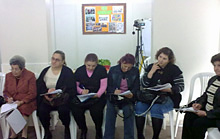
Service. It was implemented by JMP–L thanks to a generous donation from “Fellowship of the Least Coin,” a global ecumenical organization.
The overall goals of the project were to:
- Increase health awareness and prevent diseases among the participants.
- Empower the participants through capacity building.
- Raise health awareness and knowledge among community members.
Lasting from November 2009 till July 2010, a series of educational activities conducted by specialists were organized, with the goal of equipping the 26 participating women with the necessary skills and knowledge about preventing disease complications, avoiding unhealthy daily activities, and maintaining healthier lifestyles.
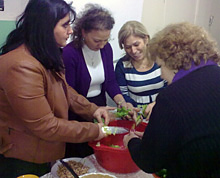
The topics tackled as part of the program included: healthy lifestyle, wise use of medicines, healthy nutrition, smoking, hygiene, osteoporosis, hypertension, health of buccal cavity, cholesterol, diabetes, depression, human behavior, physical exercise, vitamins, minerals, and spiritual uplift.
The lecturers included physicians, nutritionists, psychologists and priests.
Besides the presentations, JMP–L offered free blood tests to all the participants, through networking and communication with other NGOs and providers of medico-social services.
The women were also empowered to disseminate their newly acquired knowledge to their families, friends and neighbors, thus
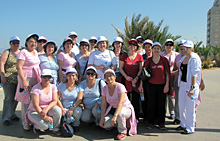
increasing the impact of the project among a larger number of people.
In addition, the project was promoted in the community through different means, including the screening of a DVD in the waiting room of JMP–L’s Medication Dispensing Department, the distribution of brochures, etc.
Overall, it is estimated that around 1,500 people benefited (directly or indirectly) from the project.
Vocational Training Course: Flower Arrangement, Soap and Candle Making
This was the second course that was offered within the framework of the JMP–L vocational training program that was designed in 2008 as part of the organization’s economic development projects. The overall program aimed at equipping men and women with knowledge and experience in different fields, to help them find jobs in the future and become self-sufficient. Job placements were secured through employment offices and networking with various organizations.
The three-month course on “Flower Arrangement, Soap and Candle Making,” started on November 10, 2009. It was held on JMP–L premises, with the participation of 24 trainees.
The course was designed in partnership with the Young Men’s Christian Association (YMCA) staff, to provide women with the techniques of flower arrangement and decorations as well as other skills for producing handmade soaps and candles for sale by working at home.
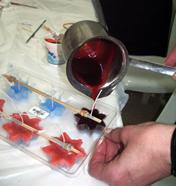

The training included 20 sessions on various topics, including chemical composition of soaps; soap recipes; soap packaging; artificial flowers and cacti; natural plants and flower assortments; as well as practical tips on flower arrangement, soap making and candle making. The program also included a visit to a soap-making factory.
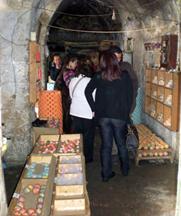
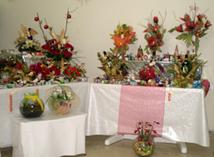
Trainers Mrs. Aida Karam and Mr. Fadi Abi Sleiman taught flower arrangement, and soap and candle making, respectively.
In December 2009, YMCA staff and the JMP–L Community Development team organized a three-day exhibition-sale of products prepared by the trainees. The event attracted the attention of all kinds of stakeholders, and raised some funds for future development projects.
“Children’s Activities” Program
JMP–L’s “Children’s Activities” Center was established in 1967, and the program was implemented till December 2009.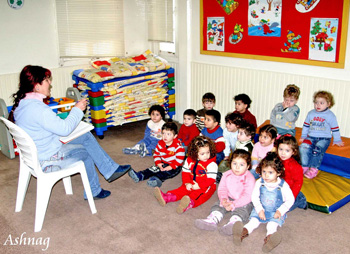
In the Armenian community, JMP–L was the first to provide such a center for more than 40 years — the only one for children of low-income working mothers and mothers who were sick and bed-ridden.
Children could benefit from the unique services of the center, which provided an educational program, nutritious food (one meal and two snacks), and recreational activities to the children. Picnics to parks and special celebrations on the occasions of Christmas, Easter, Independence Day, and birthdays of children — in the presence of their mothers — were part of the program.
The Howard Karagheusian Commemorative Corporation (HKCC) provided the medical care for the children through periodic check-ups and vaccinations.
Mothers received guidance and counseling. Periodically, meetings were held with the parents. The JMP–L program coordinator and/or the social worker, who supervised the center with the assistance of seven staff members, followed up the special cases to help them 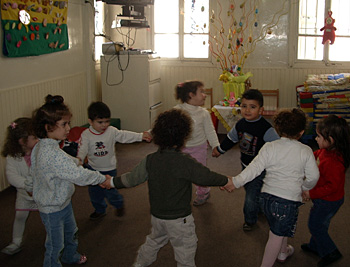 solve their problems — family, medical or financial.
solve their problems — family, medical or financial.
During the school year, the center operated from 7:00 a.m. to 4:00 p.m., while during the three summer months, it opened till 3:00 p.m.
Through this program, JMP–L provided access to affordable services for working mothers with low income, who could continue working to contribute to their family’s income and to improve the living conditions of the family. This service was also helpful for sick mothers who needed assistance with child care.
From 2006 till 2008, around 63 children attended the center every year.
The services also included a Summer Playground Program for the children of the center and their older siblings.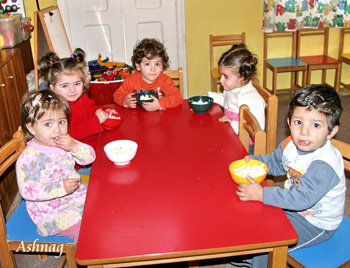
Income Generation Through Information and Communication Technology (ReachUp!)
Partnering with the Howard Karagheusian Commemorative Corporation (HKCC), JMP–L implemented a training program in business and computer skills 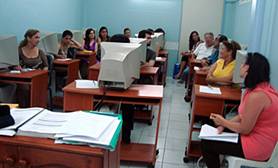
from November 2008 until September 2009 in HKCC’s computer room.
This economic development project was called “ReachUp!” or “Income Generation Through Information and Communication Technology (ICT) for Development: Empowering Communities and Stimulating Economic Growth.” It was also held by 14 other Lebanese NGOs in various regions of the country, and was organized by the Digital Opportunity Trust (DOT), a Canadian-based international non-profit organization funded by the Canadian International Development Agency (CIDA), in partnership with the Young Men’s Christian Association (YMCA) Lebanon.
The objective of the training was to train local community members on the use of ICT to empower them to generate income, improve their living conditions, and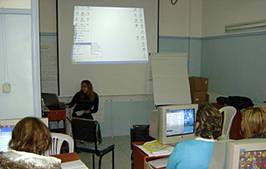 create sustainable livelihoods.
create sustainable livelihoods.
The project targeted owners of small enterprises and/or businesses or those who wanted to start a small business. Participants were familiarized with the use of computers and acquired basic business and marketing skills.
HKCC was one of the four NGOs chosen to implement the project in Mount Lebanon. Upon HKCC’s request, JMP–L ran the training. JMP–L’s Community Development team leader Taline Ladoyan was the trainer.
The program had three cycles (each one lasting three months), giving the opportunity to a total of 36 men and women to participate:
- 1st cycle: January 8–March 12, 2009
- 2nd cycle: March 17–May 21, 2009
- 3rd cycle: July 7–September 17, 2009
Through this course, the participants identified their interests, defined their goals, acquired new skills, and enhanced their self-confidence and self-awareness.
The graduation ceremony of the DOT project for trainees from across Lebanon was held on June 18, 2009, at the UNESCO Palace. Eighteen of the 570 graduates were JMP–L trainees, who had completed the training and got certificates.
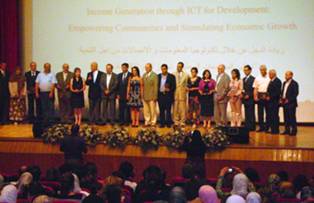
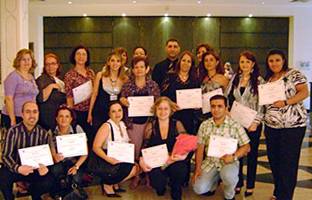
Empowering the Parents of the Children Attending the “Children’s Activities” Center
In 2008 and 2009, the mothers, fathers and immediate caregivers (such as grandparents) of children attending the JMP–L “Children’s Activities” Center were 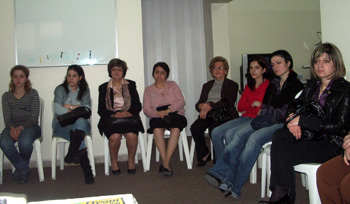 invited to take part in brainstorming sessions, during which they were asked to come up with educational and recreational activities for them.
invited to take part in brainstorming sessions, during which they were asked to come up with educational and recreational activities for them.
The sessions were held in late afternoons (as most of the invitees worked full-time), and babysitting was provided to enable them to participate in these meetings.
As a result of these brainstorming activities, four to six discussions are held annually on topics of interest to them. Led by specialists in different fields, the discussions have revolved around such topics as early childhood health, child psychology, nutrition, hygiene, first aid, and child care.
Developmental Health Program for Women
This program, under JMP–L’s Medication Dispensing Department, started in 2006 with a pilot project targeting hypertensive women. The pilot project  included 15 sessions from March 30 till November 21, 2006. Through a participatory, democratic and holistic approach, 13 hypertensive women participated in an educational, recreational and empowering program. The aim was to teach them to lead a healthier lifestyle.
included 15 sessions from March 30 till November 21, 2006. Through a participatory, democratic and holistic approach, 13 hypertensive women participated in an educational, recreational and empowering program. The aim was to teach them to lead a healthier lifestyle.
At the end of the pilot project, the targeted women reported that they felt healthier and more respected. They learned the importance of taking good care of their health. They also prepared an educational brochure (in Armenian, PDF, 208KB) through which they aimed at leaving a ripple effect by sharing what they learned with others.
Encouraged by the success of the pilot project, a similar program was run from April 17 till the end of October 2008, this time to raise awareness of health issues among 12 women aged 45–60.
The goals of this project were to:
- Have a positive impact on the general health of the women, particularly on their emotional, mental and social health.
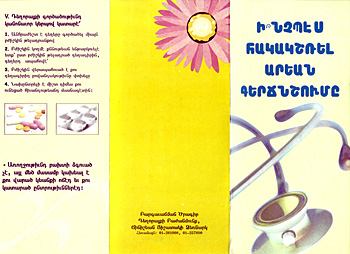
The cover of the informative brochure in Armenian (PDF, 208KB) prepared by the women who participated in the pilot project, to share tips on how to combat hypertension. - Reduce the stress or the anxiety level of the participants.
- Motivate women to engage in stress-relieving practices.
- Increase the awareness of the effect of personal behavior on health in general.
- Cultivate the women’s feeling of well-being by nurturing a sense of belonging to a group.
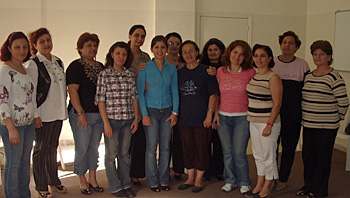
Vocational Training Course: Food Serving and Catering
This was the first course that was offered within the framework of the JMP–L vocational training program that was designed in 2008 as part of the organization’s economic development projects. The overall program aimed at equipping men and women with knowledge and experience in different fields, to help them find jobs in the future and become self-sufficient. Job placements were secured through employment offices and networking with various organizations.
The training course on “Food Serving and Catering for Various Occasions” took place from March 4 till May 30, 2008, on the premises of the Mesrobian Technical College in Bourj Hammoud. Twenty-one single and married women participated in the course.
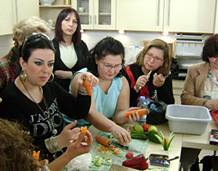
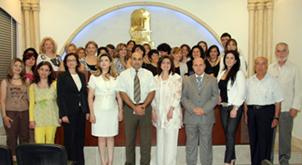
Twelve locally and internationally renowned Lebanese chefs and other experts voluntarily invested their time as trainers and shared their years of experience with the participants.
The training included such topics as the preparation of the dining table, decoration and presentation of dishes, nutrition and cooking, preparation of a reception, kitchen safety, hygiene, and serving of drinks and beverages.
Besides the food-preparation courses, the training also covered a wide array of topics related to other useful skills and issues, such as interpersonal and communication skills, teamwork, customer service, budgeting, time and stress management, outer appearance, and employee obligations.
Summer Playground Program
The Summer Playground Program was held for children of working mothers from 1995 till 2007, on the premises of JMP–L and of different schools in Bourj Hammoud.
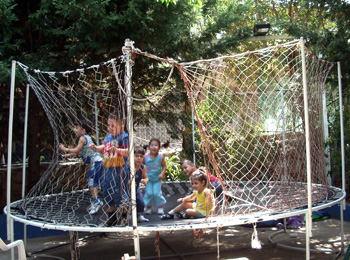
The program included educational and recreational activities. Children also learned songs and Bible stories; in this, the World Vision had an input.
During this well-structured and effective program, several outings were organized for children, including trips to parks, swimming pools, museums, a children’s library, and the dental clinic of HKCC to learn about dental and personal hygiene.
Every year, 65 children participated in the program, under the care of 11 temporary staff members and the overall supervision of the coordinator of the “Children’s Activities” Program.
This program was phased out as other similar programs are offered by other organizations in the community.
These are some testimonies of children who participated in the 2005 Summer Playground Program:
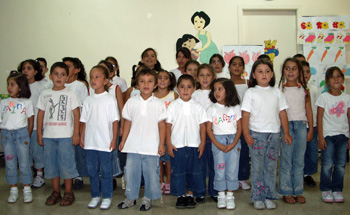
- “We have learned more about God’s love.” (L.B.)
- “I started to love God and worship him daily.” (G.H.)
- “I will miss the summer school games, the activities, the dance classes, the outdoor games, specially the trips.” (N.A.)
- “My teachers taught me to play friendly, help those who need help, be respectful to the older ones, like Jesus wants us to be.” (O.N.)
- “Thank you Mrs. P.A. for your tender and loving heart.” (V.K.)
Relief to Lebanon in 2006
After the July–August 2006 war in Lebanon, JMP–L, in cooperation with the social welfare organizations of Bourj Hammoud and Sin el Fil, volunteered to assist the displaced families residing in one of the public schools in Bourj Hammoud and offered site management and relief assistance.

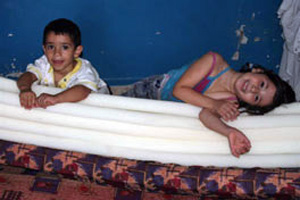
The Presbyterian Disaster Assistance (PDA) and the JMP U.S. Advisory Committee (USAC) allocated a total of $55,000, which JMP–L distributed for emergency relief assistance in 2006 and early 2007. Around 1,370 individuals benefited from the assistance offered by JMP–L from August to December 2006, in terms of medications, food coupons, cash assistance, and medical assistance. In addition, around 130 displaced families received material assistance from JMP–L.
Read a relevant success story.
You can also check out the PDA situation reports about assistance provided to the victims of the 2006 war.
Economic mapping
Taking into consideration that family income is essential for self-sufficiency and well-being, the Community Development Core Committee organized three meetings and held discussions with unemployed women in the area covered by the JMP–L Community Development Program, in November 2005. The women discussed the jobs they would like to have and made worthy suggestions about economic projects.
From February 20 to March 6 of 2006, an economic mapping was conducted while planning these projects. Volunteer women visited shops and workplaces in the area to get acquainted with various skills and trades, and to consider the job opportunities they might provide. After completing the survey, the participants prepared the economic mapping of the area.
No completed projects are currently listed for this year.
No completed projects are currently listed for this year.
No completed projects are currently listed for this year.
No completed projects are currently listed for this year.
No completed projects are currently listed for this year.
No completed projects are currently listed for this year.
Over the years, JMP–L provided financial assistance to:
- The dental clinic of the Armenian Prelacy of Lebanon.
- The creation of the Haigazian University teaching program on children’s psychology.
- The efforts of the social welfare agencies of the three Armenian denominations to hire social workers holding university degrees.
- The building of the EHLAN public houses and social work involved in this project.
- School children for school-related expenses (not tuition).
- The three Armenian orphanages where children of disadvantaged or marginalized families were receiving lodging and education.
- Elderly Home Care.

